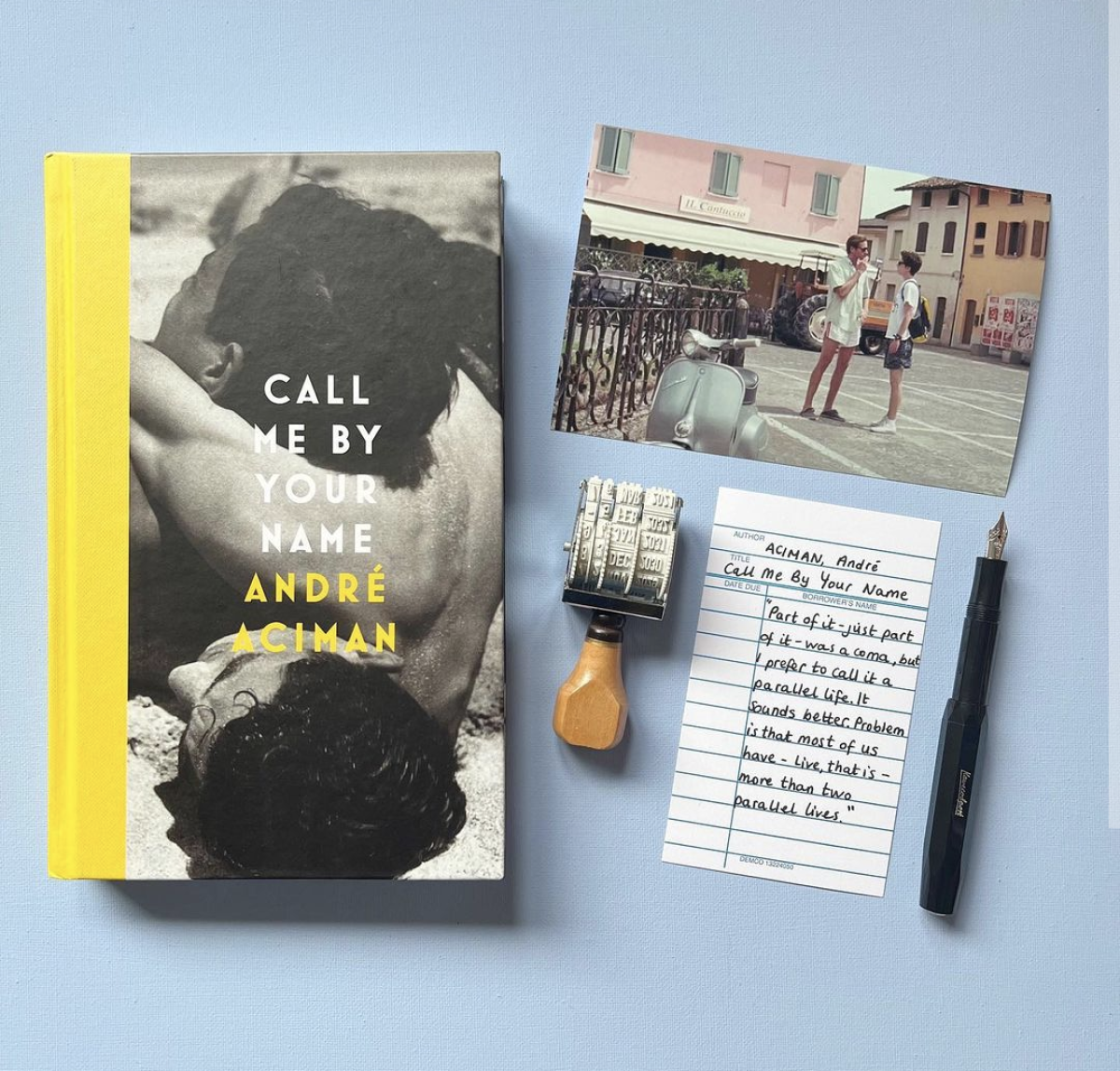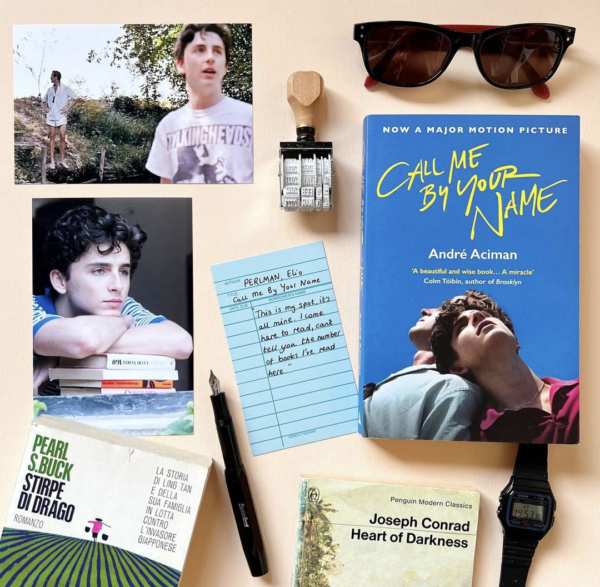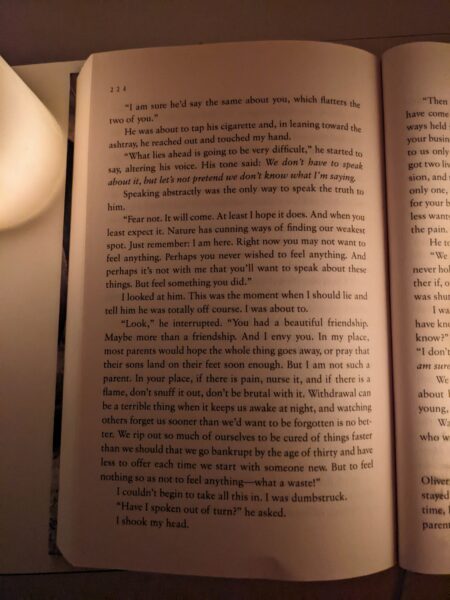The beauty behind Call Me By Your Name
By Erin Botten

After its initial release in 2007, André Aciman’s Call Me By Your Name made little impact in the 00s cultural sphere. Yet, in the years following, the book has become a modern classic in both the literature and LGBTQ+ community.
From its cinematic release starring Armie Hammer and Timothée Chalamet (and a peach), to inspiring Lil Nas X’s ‘MONTERO (Call Me By Your Name)’, the novel has firmly secured its position in 21st-century culture. But, in the whirlwind since CMBYN’s release, the beauty of the book itself easily gets lost, along with its quiet personable significance to each reader.
This month, Aciman has brought the novel’s attention away from the silver screen limelight and back towards its pages. Releasing a new cover, CMBYN has bid farewell to its blue summer hues, opting for a vintage Italian cover.
I’d read the novel after embarking on my lockdown Chalamet phase, watching every film the actor has been in. I was drawn to the dragged-out romance, particularly Aciman’s intricate weaving of classical music, literature, and philosophy, adding to the novel’s daydream likeness. It’s fair to say director Luca Guadagninio brought Aciman’s intense and intricate writings to life, with every rewatch being as encapsulating and refreshing as every re-read.
That’s what’s so unusual about CMBYN, it can be consumed over and over and over again endlessly. Every time I read it, it felt like a new book, questioning if the same passages had been there before. Every sentence was complex and thought out, at times stretching for half a page before reaching a full stop. The emotions behind the lines were themselves complex and up for subjective interpretation each time they are read.
I think that’s why I, like most frequent readers of CMBYN, found solace in the novel: It sold a dream rooted in reality. The drawn-out and painstaking emotions felt by Elio are both distant and familiar to readers, depending on their interpretation. Yet, it wasn’t until I began my American cultural exchange that I realised the silent significance CMBYN had, or how accurate it was in portraying the reality of summer flings.
Wrapping up my final exam and a tumultuous few months of heartbreak, I left dreary Manchester for the heart of Maine. For eight weeks, I was to be a camp counsellor, living and working with the same people every day. Camp culture is huge in the States, fuelled by sunshine, secrets, and summer bliss – resembling the summer bliss of Crema.

She knocked on my cabin door one night, desperately demanding to speak to me. I looked at her blankly, mid-conversation with a camper, sending her away. By midnight, we met quietly, keeping our voices low and anticipation at bay.
“Sooo, what do you think this is about?” Frankie would say, over and over again. I knew, but I wasn’t going to say, not willing to risk embarrassing myself by being in the wrong. Over what felt like a lifetime of dropping hints that I did know, she finally blurted it out: “I like you.”
So, then it began. A foreign European in America for the summer. Days off escaping to whatever paradise we could find. A dragged-out build-up from both the confession to the first kiss. Hopping over law firm fences, a keg of flowers; drives home lit by the evening glow through rural Maine. Secret notes in letter boxes, or hidden by beds. Midnight meets in treehouses or by the lake. Those were how I spent my days for eight weeks, searching for intermissions to spend with Frankie. It was all-consuming, living in blind secret as merely ‘best friends’.
It made it feel okay, being in an alien environment in a job that had no breaks. We laughed at our similarities and the games we blatantly played. Wearing makeup, eating together, the hints we’d drop to each other to say that we liked each other without having to utter the words. The game of will they won’t they.
Like the novel, both of us knew it would end and when.
The reality of flings, allowing ourselves to fall in love without being in love, for admitting that you were in love only adds to the pain. Love is addictive and destructive; I was walking a fine line with Frankie.
I found solitude in the simple circumstances of Elio and Oliver’s relationship, knowing mine too would end in the same way. It was a summer love, which brought both comfort and an impending end. For the first time, I wasn’t caught out or left behind. Instead, there was a risk of it being the other way around.
Breakups are akin to grief. That person you once knew no longer exists. What remains are merely memories tainted by either distorted warmth or despair. Grief is cruel and creeps up, with nature finding the weakest moments to wreak silent havoc.
I knew that was to come, but for Frankie, this was a blind game that was yet to be played. I didn’t want her to be caught off guard. I didn’t want there to be regrets or tainted memories. I didn’t want her to be stung like I had been so many times before. So, reminiscent of Oliver’s stolen postcard, I wrote to her my favourite passage: Mr Pearlman’s monologue.

It’s been nearly four months since I’ve seen Frankie. We still text now and then, but it isn’t the same; I know it never will be. I know there’s a chance I won’t see her again.
That’s the beauty of CMBYN, it doesn’t sell you a fantasy. Instead, it sells the pains of reality and authenticity. Aciman could have easily wrapped up the novel when Elio and Oliver part ways, but instead he explores their grief in the aftermath and years down the line. Where there once was intensity is now careful reminiscence, tiptoeing around what was actually felt then and now. Will they won’t they?
Call Me By Your Name has continued to grow in prominence and has stood the test of time because of Aciman’s narrative of life, loss and emotion. It exposes love for what it is, and the unshakable memories that come with it. Ultimately, Call Me By Your Name is a novel that provides a quiet personable significance to each reader, and comfort in the wake of heartbreak.
Purchase the new edition of Call Me By Your Name or its sequel, Find Me, in-store or online at Waterstones.







